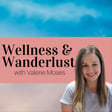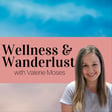
138. The Four Pillars of Vitality with Neil Cannon
How can we take on a more holistic approach to our wellness?
This week on the show, we’re chatting with Neil Cannon, health coach, best-selling author and podcast host. Neil is driven to help people seek out the root causes of their ailments. In our conversation, Neil introduces us to the Four Pillars of Vitality (physical, mental, emotional and energetic) and shares how he incorporated lifestyle changes in order to treat lifelong eczema and other health concerns.
We also discuss the journey of healing through trauma, the power of forgiveness, how to remove inflammatory foods from our diets, and so much more.
If you enjoy this episode, please feel free to rate and review the podcast on whatever app you’re listening on, and share with a friend!
OUR SPONSOR
This episode is brought to you by ENERGYbits algae tablets. Use my code WELLNESSANDWANDERLUST for 20% off your purchase!
Website: energybits.com
Podcast Episode: Boosting Your Immune System with Algae with Catharine Arnston
CONNECT WITH NEIL
Website: https://www.vitalitysecret.com
Facebook: https://www.facebook.com/NeilCannon1980
Instagram: http://instagram.com/NeilCannonVitality
YouTube: https://www.youtube.com/NeilCannon80
Podcast: https://vitalitysecret.com/podcast/
CONNECT WITH THE SHOW
Website: WellnessAndWanderlust.net
Instagram: www.instagram.com/wellnessandwanderlustblog
Facebook: www.facebook.com/wellnessandwanderlustblog
Twitter: www.twitter.com/moses_says

